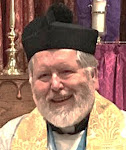 Our journey sets out from God in our creation, and returns to God at the final judgement. As the bird rises from the earth to fly, and must some time return to the earth from which it rose; so God sends us forth to fly, and we must fall back into the hands of God at last. But God does not wait for the failure of our power and the expiry of our days to drop us back into his lap. He goes himself to meet us and everywhere confronts us. Where is the countenance which we must finally look in the eyes, and not be able to turn away our head? It smiles up at Mary from the cradle, it calls Peter from the nets, it looks on him with grief when he has denied his master. Our judge meets us at every step of our way, with forgiveness on his lips and succour in his hands. He offers us these things while there is yet time. Every day opportunity shortens, our scope for learning our Redeemer's love is narrowed by twenty-four hours, and we come nearer to the end of our journey, when we shall fall into the hands of the living God, and touch the heart of the devouring fire.
Our journey sets out from God in our creation, and returns to God at the final judgement. As the bird rises from the earth to fly, and must some time return to the earth from which it rose; so God sends us forth to fly, and we must fall back into the hands of God at last. But God does not wait for the failure of our power and the expiry of our days to drop us back into his lap. He goes himself to meet us and everywhere confronts us. Where is the countenance which we must finally look in the eyes, and not be able to turn away our head? It smiles up at Mary from the cradle, it calls Peter from the nets, it looks on him with grief when he has denied his master. Our judge meets us at every step of our way, with forgiveness on his lips and succour in his hands. He offers us these things while there is yet time. Every day opportunity shortens, our scope for learning our Redeemer's love is narrowed by twenty-four hours, and we come nearer to the end of our journey, when we shall fall into the hands of the living God, and touch the heart of the devouring fire.Advent brings Christmas, judgement runs out into mercy. For the God who saves us and the God who judges us is one God. We are not, even, condemned by his severity and redeemed by his compassion; what judges us is what redeems us, the love of God. What is it that will break our hearts on judgement day? Is it not the vision, suddenly unrolled, of how he has loved the friends we have neglected, of how he has loved us, and we have not loved him in return ; how, when we came (as now) before his altar, he gave us himself, and we gave him half-penitences, or resolutions too weak to commit our wills? But while love thus judges us by being what it is, the same love redeems us by effecting what it does. Love shares flesh and blood with us in this present world, that the eyes which look us through at last may find in us a better substance than our vanity.

















0 comments:
Post a Comment